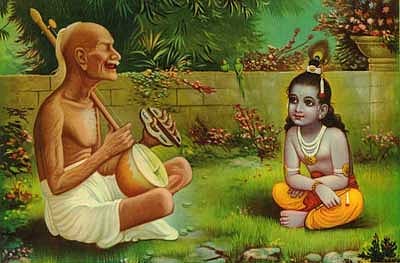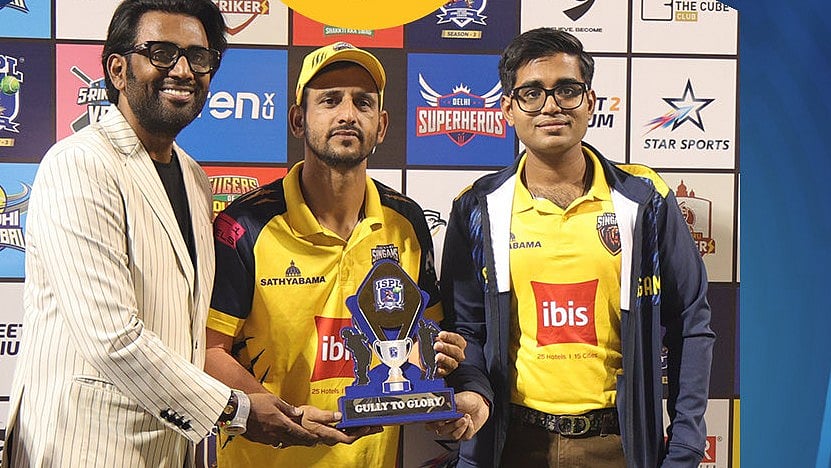Surdas could express his devotion through his talented voice and poetry unsurpassed by anyone, writes MEERA S. SASHITAL.
The sect which Vallabhacharya founded came to be known as ‘pushtimarg’. Love for Krishna and devotion to Him was the hallmark of the tenets of this sect. His successor was his own son, Vithalnath who is said to have completed the commentaries on the scriptures begun by his father. To develop his father’s teachings and to further the cause of Krishna Bhakti, Vithalnath chose Music as the right medium. He selected eight devotees for this purpose that came to be known as ‘Ashtachap’. They were well versed in Music and were supposed to narrate the life story of Krishna in song for the benefit of the people.
The best known among these eight saint-singers was Surdas the blind poet whose religious fervor and poetry matched well with the intensity of his devotion to Krishna. Surdas could express his devotion through his talented voice and poetry unsurpassed by anyone. It seems though other members of the group made their contribution towards propagating their cult; the contribution of Surdas has been estimated as the best.
There is no authentic information regarding Surdas’s exact place and time of birth but whatever little is known about Surdas it seems is based on the Bhaktamala of Nabhadas. Surdas’s real name was Bilvamangal and he was the son of a pious Brahmin named Ram Das who lived in a village on the banks of the river Krishnaveni in South India. It is learnt Surdas’s father instructed him in religious discourses and made him study scriptures. But, Surdas lost his father while quite young and having nobody to guide him he fell prey to vicious habits and bad company. He is said to have inherited his father’s estate. It is believed that Surdas had a long life going beyond hundred years from 1479 to 1586.
Regarding Surdas’s blindness opinions differ. Many Hindi writers and critics have opined that he was not blind. From the story of the Ashtachap culled from Chaursi Baishavaan Ki Barta (the life accounts of 84 Vaishnavas) by Gosain Gokulnath, he has described that Surdas was not born blind, but he courted blindness. The views of a leading Hindi writer and critic, Prabhakar Machwe on Surdas’s blindness says:
“Surdas rarely refers to his blindness. By the eyes, the beautiful, large enchanting eyes, are always alluded to in his sweet lyrics. In fact, the eyes form the central “motif’ of his poetry. He refers to them in various ways: 1) “Naina dheet atihee bhaya” (2) “Udho, ankhiyan ati anuragi” (3) Nain-salone Shyam Hari Kab avahinge” (4) Kaise panghat jaun Sakhiri?”
Gosain Gokulnath describes in his Ashtachap about Surdas: “Surdas was not born blind, but he courted blindness. The other legend goes that upon being admonished by a beautiful lady, in the snare of whose love poor Bilvamangal fell, he extinguished the light of his eyes with his own hands. And since then Surdas or Sur did not remain a proper name but became a common name for a blind singer in the Hindi language.”
Regarding Surdas’s life, it is said once he happened to meet Chintamani, the dancing girl in a nautch party which he attended with his friends. He was so much enamoured by her beauty that he gave all his property to her and became virtually her slave. His love for her was so ruthless that even on the day of performing his father’s Shraddha, he only thinks of her. Completing the ceremony half-heartedly and unable to bear the separation, he rushes to her on that stormy night. The ferryman refuses to take him, so despite it being a stormy night of thunder and lightning, he crosses the river with the aid of a dead-body mistaking it for a log of wood.
Chintamani was asleep not having expected Surdas on his father’s Shraddha day. Surdas scales the walls with the help of a huge snake which he takes for a rope. Chintamani is stunned beyond word at the sight of him. She rebukes him for coming to her even on such a sacred day. She tells him that had he the same longing to have ‘Darshan’ of the Lord, he would have by now attained eternal Bliss.
The wise words of Chintamani touched Surdas’s heart and he realized his mistake. He remembered his father’s teachings too and wept bitterly. Surdas acknowledged her as his Guru for removing his illusion and he departed in search of God. But very soon he was attracted by a young and beautiful girl, a wife of a merchant. He immediately realizes his folly and accusing his eyes to be the cause of all these passions takes two thorns and pricks his eyes.
Since then Surdas lived a life of saintliness singing the praises of Lord Krishna and pining for his vision. It is said, later in his life, while roaming in the jungles, Lord Krishna Himself comes disguised as a cowherd boy and takes him to Vrindavan where Lord Krishna gives him darshan and restores his eyesight. There is another story which tells how when Surdas fell in a well Lord Krishna rescues him and grants him momentary eyesight to see His vision.
In any case it seems certain that Surdas was attracted towards Krishna Bhaktii early in life. He was greatly influenced by Vallabhacharya and his doctrine of devotion. As we know, the great Acharya’s son Vitthalnath had included Surdas in his group of eight, the Ashtachap.
Surdas is renowned for his five poetic works, viz. Sursagar, Sur Saravali, Sahitya Lahiri, Nala-Damayanti and Vyahala. Sursagar is adjudged to be the best known work and his fame as a peerless poet and writer of lyrics lies on this. This work contains 1107 padas and is divided into twelve cantos, big and small. Unlike Tulsidas who used Avadhi for his verse and gave it the first-rate status in literature, Surdas used Brajabhasha for his famous padas and raised it to still greater heights.
Surdas had the unique quality of depicting the childish pranks of Lord Krishna and the mother’s love for the child. It is mainly because of his description of Krishna’s childhood, his frolics and innocence and Yashodha’s doting love for Krishna that Krishna is often worshipped as a child-God. This powerful amalgam of mother-child love and divinity presented by Surdas evokes devotion in the reader’s mind. Sursagar, his best work, consists of songs and lyrics pertaining to infant Krishna.
One of the famous songs describes how pretending innocence the child Krishna denies having eaten butter when mother Yashoda chides him seeing butter smeared all over Krishna’s mouth! The most touching and moving part of Sursagar is the ‘Bhramargeet’ in which we find Udhav trying to convince the Gopis with his philosophy of ‘Nirguna’and the Gopis, immersed in their pure love and devotion for their beloved idol of Krishna, floundering to refute his arguments. Surdas has brought out beautifully the difference between the approaches of the Jnani (an intellectual) and the bhakta (devotee) proving that he discarded the claims of reason and based his devotion entirely on emotional dedication to Krishna
“Though simple and part of every-day life, these descriptions, apparently no more than plaints and innocent reproaches are exceedingly fascinating. They never fail to create an impression of tenderness and grandeur. In them one can see the depth of devotion and extreme fondness which borders on ecstasy. Only an inspired devotee could sing of these trivialities and get God-intoxicated himself and instill a similar feeling in others as well”. It is said that the last song which Surdas sang in Raga Bihagaro is of three and a half lines and is so expressive of a blind man’s yearnings: “Khanjan Nain Roop Rasa Mata.” It is told that with his last song Surdas fell unconscious and became one with God leaving the mortal coil.
R.A. Dwivedi has aptly said that the way in which Surdas discards the claims of reason and bases his attitude entirely on an emotional dedication to Krishna reminds us of the Sufis and their path of love. He has contended that the best verses of Surdas reach the highest level of lyrical excellence.









